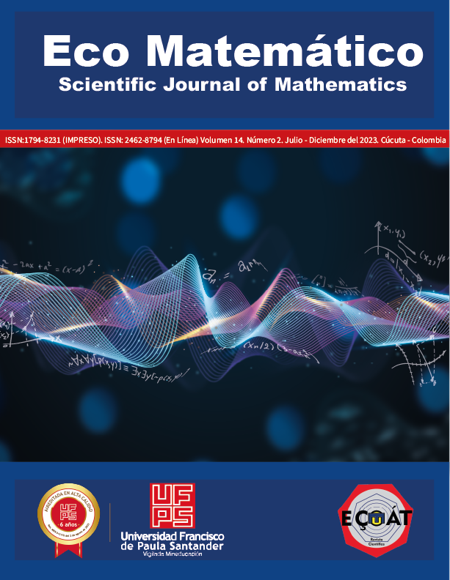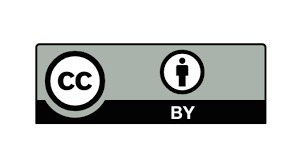Strategies based on the box of polynomials that reduce difficulties in learning the factorization process of polynomials with integer coefficients
Estrategias basadas en la caja de polinomios que disminuyen dificultades en el aprendizaje del proceso de factorización de polinomios con coeficientes enteros
Main Article Content
The transition from arithmetic to algebra causes difficulties in students due to the change in the higher level of abstraction that algebra has with respect to arithmetic, since they encounter concepts where they must apply previous knowledge of a different nature and it is here where the student He faces various situations of insecurity, mistrust, fear, and the unknown. The objective of the research was to provide elements of reflection for the learning of factorization mediated by the use of the box of polynomials as a didactic tool. The methodology was framed in the qualitative approach, using an action research methodological design, using techniques such as questionnaires and observation to identify difficulties in solving factoring exercises in ninth grade students, workshops focused on the polynomial box tool were designed. to approach factoring in an innovative way and was finally evaluated with a post-test. The results of the investigation indicated that the most common difficulties of the students were in the simplification of terms, the identification of common factors and the application of factoring properties, which often led to incorrect answers. The findings obtained in each stage of the didactic strategy reflected the positive impact of the box of polynomials in the learning process, from familiarization with the tool to the application of algebraic-geometric procedures, it was observed how the students showed an improvement in their understanding and skills in factoring polynomials, concluding that technological tools are valuable to improve the teaching and learning of abstract mathematical concepts.
Downloads
Article Details
Baltazar, A., Rivera, J., Martínez, R., Cárdenas, H, & Amaya, T. (2015). Errores y dificultades que presentan los estudiantes de octavo grado al factorizar polinomios. Acta Latinoamericana de Matemática Educativa. Universidad de Sucre. (Colombia)
Barallobres, G. (2016). Diferentes interpretaciones de las dificultades de aprendizaje en matemática. Educación Matemática, 28(1), 39–68. DOI: https://doi.org/10.24844/EM2801.02
Barallobres, G. (2017). Ciertos fenómenos didácticos que caracterizan las dificultades de aprendizaje en la transición de la aritmética al álgebra en la escuela secundaria. Unión. Revista Iberoamericana de Educación Matemática, 51, 27–47.
Bozzalla, A & García, S. (2014). Espacios de reflexión sobre la enseñanza de la matemática en la escuela media. Análisis gráfico como puerta de entrada hacia el aprendizaje de sistemas de ecuaciones lineales de 2x2. En Lestón, Patricia (Ed.), Acta Latinoamericana de Matemática Educativa. 1031-1039.
Castro, W., Martínez, J & Pino, L. (2017). Niveles de algebrización de la actividad matemática escolar: análisis de libros de texto y dificultades de los estudiantes. REDIMAT. Journal of Research in Mathematics Education, 6(2), 164–191. DOI: https://doi.org/10.17583/redimat.2017.1981
Ceballos, F. (2009). El informe de investigación con estudio de casos. Revista Internacional de Investigación En Educación, 1(2), 413–423.
Gasco, J. (2017). La resolución de problemas aritmético - algebraicos y las estrategias de aprendizaje en matemáticas. Un estudio en educación secundaria obligatoria (ESO). RELIME - Revista Latinoamericana de Investigación En Matemática Educativa, 20(2), 1–28.
Jiménez, A & Gutiérrez, A. (2017). Realidades escolares en las clases de matemáticas. Educación Matemática, 29(3), 109–129. DOI: https://doi.org/10.24844/EM2903.04
León, C., Solano, N., Gómez, A & Fernández, R. (2020). Dominio afectivo y prácticas docentes en Educación Matemática : un estudio exploratorio en maestros. UNIÓN. Revista Iberoamericana de Educación Matemática, 58, 129–149.
Leyton, A & Rojas, C. (2016). Concepciones presentes sobre la factorización en estudiantes de 15 a 16 años. RECHIEM. Revista Chilena de Educación Matemática, 10(1), 79-84.
López, J. (2009). La importancia de los conocimientos previos para el aprendizaje de nuevos contenidos. Innovación y Experiencias educativas. 1-14.
Marcilla, C. (2013). Las TIC en la didáctica de las matemáticas. [Tesis Maestría]. Universidad de Burgos.
Morales, S. (2017). Errores que presentan estudiantes de undécimo, en el uso del lenguaje algebraico. [Tesis pregrado]. Universidad Pedagógica Nacional.
Ricce, C., Díaz, B & López, O. (2021) El aprendizaje colaborativo en la enseñanza de las matemáticas: revisión sistemática. Acción y Reflexión Educativa. 47.
Rojas, B. & Movilla, M. (2018). La metodología resolución de problemas matemáticos como estrategia para el desarrollo del pensamiento crítico en los estudiantes de grado 11º de la Institución Educativa Departamental Silvia Cotes de Biswell. [Tesis Maestría]. Universidad de la Costa - CUC. Barranquilla
Sandín, E. (2003). Investigación Cualitativa en Educación. Fundamentos y Tradiciones. Madrid. Mc Graw and Hill Interamericana de España (pp.258). Revista de Pedagogía, 26(77), 48-58.
Soto, F & Mosquera, S. (2017). La caja de polinomios. Universidad de Nariño – Colombia. VIII Congreso Iberoamericano de Educación Matemática.
Villalobos, M & García, M. (2021). El aprendizaje significativo de contenidos matemáticos para nivel medio superior en escenarios educativos virtuales. Educación Creadora. 1. 43-53.







